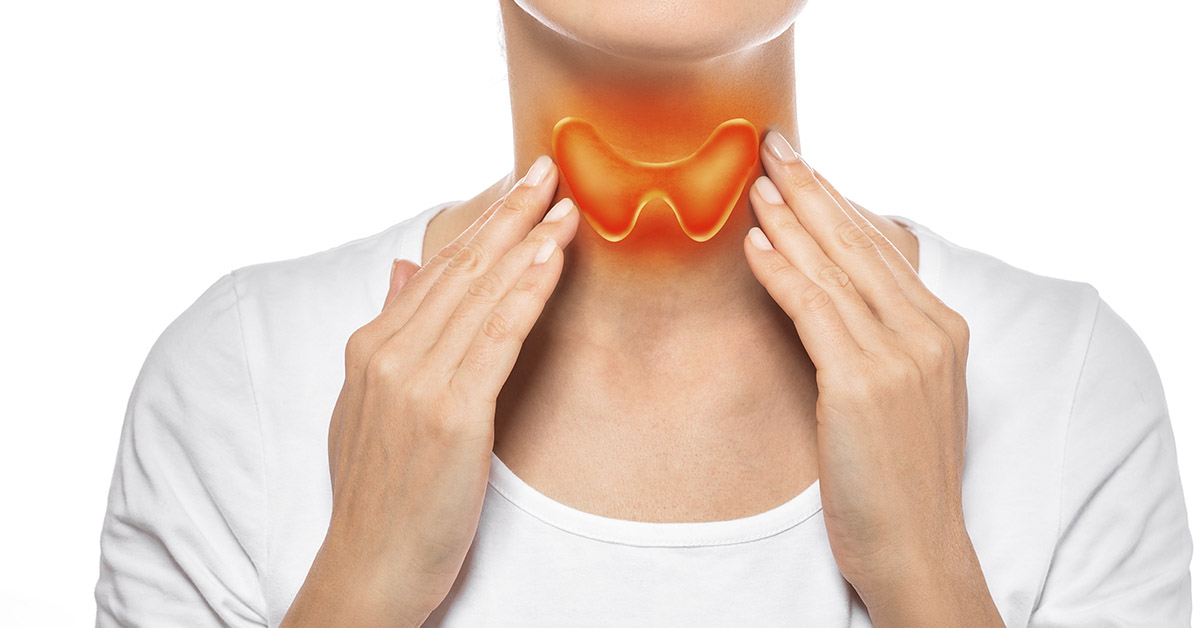Your thyroid is a butterfly-shaped gland in your neck that produces hormones that regulate many important body functions. The hormones produced by your thyroid include thyroxine (T4), triiodothyronine (T3), and calcitonin. When these hormones are out of balance, you will develop thyroid disease. According to the American Thyroid Association, an estimated 20 million Americans have some sort of thyroid disorder, and up to 60% of them are unaware of their condition. That’s 12 million people who are simply unaware (1).
What Is Your Thyroid and What Does It Do?

To understand the effects of thyroid disease, you first need to understand what the thyroid is and what it does. Your thyroid is controlled by the pituitary gland, a pea-sized endocrine gland located at the base of the brain. The pituitary gland releases two important hormones: thyroid stimulating hormone (TSH) and adrenocorticotropic hormone (ACTH). TSH signals the production of T4 and T3 in your thyroid, while ACTH stimulates the production of aldosterone and cortisol from the adrenal glands. (1)
When both your thyroid and pituitary glands function normally, they work together to regulate your metabolism, growth rate, and body temperature. As you can imagine, if either one of these malfunctions, it will impact your health. If you have a thyroid disorder, it will affect every cell in your body. The symptoms are often overlooked because they are so diverse. Thyroid disorders include hypothyroidism (underactive thyroid), hyperthyroidism (overactive thyroid), and goiter (enlargement of the thyroid gland). Each of these conditions can have anywhere from mild to quite grave consequences if left untreated.
Read More: 12 Million are Unaware They Have Thyroid Disease. Do You Know The Signs?
Symptoms of Hyperthyroidism

Hyperthyroidism is a thyroid disease in which the thyroid gland produces too many certain hormones. This is often due to an overactive thyroid, which may be caused by a benign tumor. The symptoms of hyperthyroidism can include (2):
- Nervousness or anxiety
- Increased heart rate and blood pressure
- Weight loss without trying or difficulty gaining weight
- Rapid or irregular heartbeat
- Heat intolerance and sweating
- Muscle weakness
- Fatigue and difficulty sleeping
- Mood swings and hyperactivity
- Diarrhea and an increased need to urinate
- Persistent thirst
- Itchiness
- Loss of interest in sex
Hyperthyroidism can also produce these physical signs:

- a swelling in your neck caused by an enlarged thyroid gland (goiter)
- an irregular and/or unusually fast heart rate (palpitations)
- twitching or trembling
- warm skin and excessive sweating
- red palms of your hands
- loose nails
- a raised, itchy rash – known as hives (urticaria)
- patchy hair loss or thinning
- weight loss – often despite an increased appetite
- eye problems, such as redness, dryness or vision problems
Read More: Should You Get Your Thyroid Checked? Here Are 10 Signs of Hypothyroidism
Symptoms of Hypothyroidism

Hypothyroidism is a thyroid disease in which your thyroid gland produces insufficient thyroid hormone. The consequences of this disease can range from mild symptoms to quite severe health problems. Signs and symptoms of hypothyroidism include (3):
- feeling tired
- sluggish or lethargic (this may be worse in the morning)
- weight gain
- hair loss
- dry skin
- constipation
- cold hands and feet
- muscle weakness
- depression
- confusion
- difficulty concentrating
- hoarse voice
- low libido
- low body temperature and sensitivity to the cold
- Irregular and/or heavy periods
Most cases of an underactive thyroid are from the immune system attacking the thyroid gland and damaging it. Hashimoto’s disease is the most common of these immune disorders that causes the immune system to attack the thyroid gland. There are some medications, however, that can also cause hypothyroidism.
What To Do If You Think You Have Thyroid Disease

If you have any of the symptoms listed above, visit your doctor. They will first do a physical exam and then test your thyroid hormone levels. If you have hypothyroidism, they may also want to run other blood tests to determine if other conditions could be causing your symptoms or aggravating them. They will then likely prescribe a hormone replacement therapy to elevate the levels of thyroid hormones in your body.
If you have hyperthyroidism, your doctor will order a radioactive iodine uptake test to determine how much hormone is in your body. They may also want to run other blood tests to check for other conditions that could be causing your symptoms or aggravating them. If the test shows that you have hyperthyroidism, they may prescribe medication to lower your thyroid hormone levels or remove part of your thyroid gland. If you notice any symptoms of hypothyroidism or hyperthyroidism, please visit a doctor immediately.
Read More: Signs, Symptoms, Triggers, and Natural Approaches to Hypo and Hyperthyroidism

